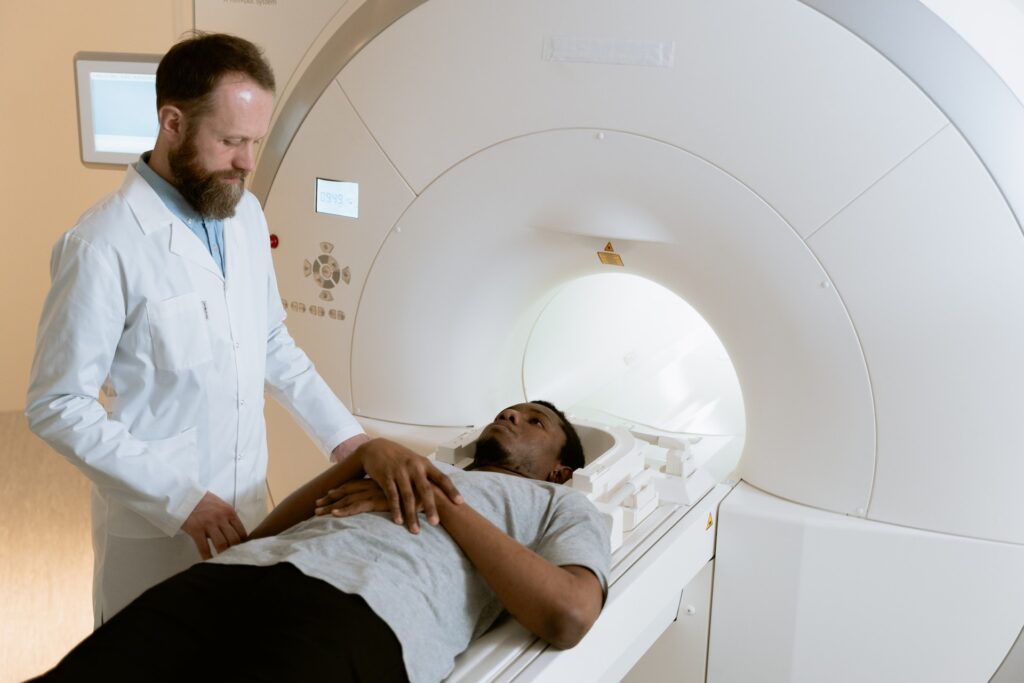
Facing your first MRI (Magnetic Resonance Imaging) scan can be a daunting experience. The idea of lying inside a narrow, noisy tube for an extended period while the machine takes images of your body might trigger anxiety. But fear not! In this blog post, we’re going to take you through the steps to prepare for your first MRI scan. We’ll cover everything from understanding what an MRI is to practical tips for making the experience as comfortable as possible. So, let’s dive in!
What is an MRI Scan?
First things first, let’s demystify what an MRI scan is all about. An MRI machine, such as a Hitachi MRI machine, uses strong magnetic fields and radio waves to create detailed images of the inside of your body. It’s a non-invasive procedure, which means no needles or incisions are involved. The primary purpose of an MRI is to diagnose various medical conditions, from injuries to diseases. Now that you know what it is let’s get you prepared.
Before the Appointment:
Consult with Your Doctor:
Before scheduling your MRI, it’s essential to consult with your healthcare provider. They will determine whether an MRI is necessary and, if so, which body part needs imaging. Your doctor will also provide you with any specific instructions tailored to your situation.
Inform the Technologist:
If you have any allergies or medical conditions, make sure to inform the MRI technologist beforehand. They need to be aware of any potential complications or risks associated with the procedure.
Ask Questions:
Don’t be afraid to ask questions! If you have any doubts or concerns about the MRI process, the technician will be happy to explain it to you. Understanding what will happen can help ease your anxiety.
Preparing for the MRI:
Wear Comfortable Clothing:
On the day of your MRI, wear loose-fitting, comfortable clothing. Avoid clothing with metal zippers, buttons, or snaps, as these can interfere with the MRI machine’s magnetic field.
Leave Metal Behind:
MRI machines are magnets, and they are sensitive to metal objects. Before your appointment, make sure to remove all jewelry, watches, and metal accessories. Also, remember to check your pockets for loose change or metal objects.
Food and Medication:
Typically, you can eat and take your regular medications before an MRI scan. However, if your doctor gives you specific instructions to fast or stop taking certain medications, be sure to follow their guidance.
The Day of Your MRI:
Arrive Early:
It’s a good idea to arrive at the imaging center a little earlier than your scheduled appointment. This will give you some time to fill out any necessary paperwork and get settled before the scan.
Relaxation Techniques:
MRI machines can be noisy and claustrophobic, which may cause anxiety for some individuals. To help you relax, consider practicing deep breathing exercises or mindfulness techniques before and during the procedure.
Bring a Buddy:
If you’re feeling particularly nervous about your MRI, consider bringing a friend or family member along. Having a familiar face in the waiting room can provide comfort and support.
During the MRI:
Stay Still:
Once inside the MRI machine, it’s essential to stay as still as possible. Any movement can blur the images and may necessitate a repeat of the scan.
Communication is Key:
If you experience discomfort or need assistance during the MRI, don’t hesitate to communicate with the technologist. They can often adjust your position or provide a panic button if you feel overwhelmed.
Think Positive:
It might help to think positively during the scan. Focus on the fact that this procedure is a crucial step in getting the right diagnosis and treatment. Imagine yourself in a peaceful place to reduce anxiety.
After the MRI:
Resume Normal Activities:
In most cases, you can resume your regular activities immediately after the MRI. There are typically no side effects, and you can return to your daily routine.
Discuss Results with Your Doctor:
After the scan, your doctor will review the images and discuss the findings with you. They will explain what the MRI revealed and any further steps that may be necessary, such as additional tests or treatments.
Common MRI Questions Answered:
Now that we’ve covered the basics, let’s address some common questions people have about MRI scans:
- Can I Eat Before an MRI?
Yes, you can usually eat before an MRI, unless your doctor instructs you otherwise. It’s essential to follow any specific fasting instructions if provided.
- How Long Does an MRI Take?
The duration of an MRI scan can vary depending on the type of scan and the body part being examined. On average, it takes 30 to 60 minutes, but it can be longer for more complex scans.
- Will I Feel Pain During the MRI?
MRI scans are painless. However, you may experience some discomfort if you have to remain still for an extended period or if you suffer from claustrophobia.
- Can I Bring Music or Earplugs?
Many MRI centers provide headphones or earplugs to help drown out the noise of the machine. However, you can also bring your music to listen to during the scan if it helps you relax.
- Can I Talk to the Technologist During the MRI?
Yes, you can communicate with the technologist during the MRI. They will provide you with a way to signal if you need assistance or have any concerns.
Conclusion
Remember to consult with your doctor, follow any specific instructions, and arrive at the imaging center prepared. During the scan, stay as still as possible, communicate with the technologist if needed, and focus on the positive outcome of the procedure.
Take a deep breath, stay calm, and trust that you are in capable hands during your MRI journey.


